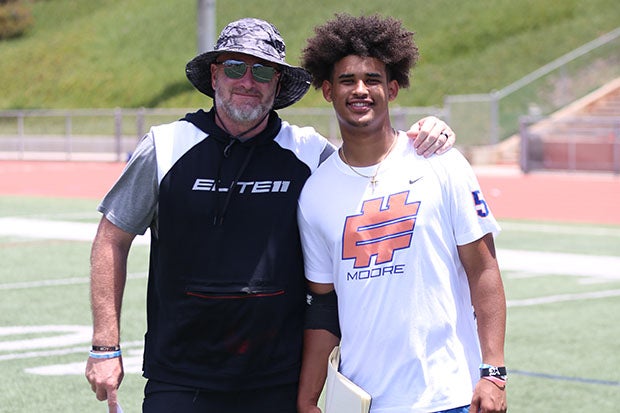Trent Dilfer has lived the NFL dream. He's won a Super Bowl with the Baltimore Ravens. He's been a top-tier analyst on ESPN.
But the head coach at
Lipscomb Academy (Nashville, Tenn.) says everything he's ever done on a football field has been leading him to become a high school football coach.
"I feel like my 42-year football life has led me to this," Dilfer told MaxPreps at the Elite 11 Finals last weekend in Southern California. "And people go ‘led you to high school football?'
"My journey, being the son of a high school football coach and the coaches I've played for and the ups and downs of my career and the TV career kind of led me to this purposeful third career."
Dilfer, who's heading into his fourth season at Lipscomb Academy, led the Mustangs to a 13-1 record and TSSAA Class AA state title last fall.

Trent Dilfer at the Elite 11 Finals in Los Angeles last week with five-star quarterback prospect Dante Moore.
Photo: Sean Dupree
While hoisting the Lombardi Trophy after his the Ravens' 34-7 Super Bowl XXXV win will forever be career defining, he said coaching high school football is as valuable and purposeful.
"Very few people get to wake up and the hair on their arm stands up because they're excited to go to work and that's what I've been able to do," he tells MaxPreps.
In some sense, he said, his current job might be more meaningful and valuable than his previous occupations.
"It's so much more than coaching," he said. "When you do it for the right reason, there really are no losses. You might lose on the scoreboard, but you might have a tough week, you might be banged up, maybe that class of kids aren't as talented as the year before, maybe you lose some coaches. You always get to impact kids."
And the kids need coaches for structure, for security and for guidance.
"They need to be loved; they need to be affirmed," Dilfer said. "They need to earn things. Entitlement is a huge problem, so they need to learn how to earn things.
"They need to be part of something bigger than themselves, have a purpose, serve one another. One of the things they need to understand, it's not the performance, but the process."
